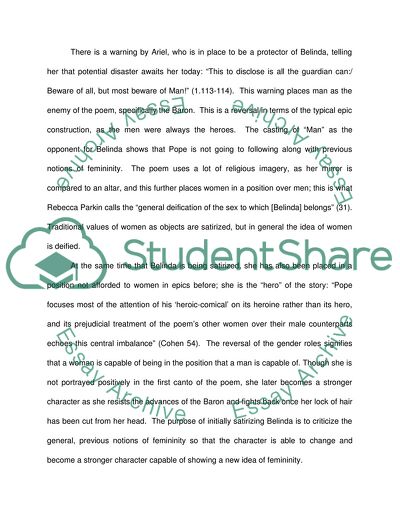
- Home
- Free Samples
- Premium Essays
- Editing Services
- Extra Tools
- Essay Writing Help
- About Us
- Studentshare
- Subjects
- Miscellaneous
- Satire and feminism in Alexander Pope's 'Rape of the Lock
Satire and feminism in Alexander Pope's 'Rape of the Lock - Essay Example

- Subject: Miscellaneous
- Type: Essay
- Level: Undergraduate
- Pages: 4 (1000 words)
- Downloads: 0
- Author: hlarkin
Extract of sample "Satire and feminism in Alexander Pope's 'Rape of the Lock"
With this in mind, he crafted his mock-epic. In order to promote new ideas of feminism, Pope needed to satirize previous notions femininity. Pope begins his poem the same way epics begin, by invoking a muse: “I sing—This verse to Caryll, Muse!” (1.3). This informs the reader that the poem will be drawing on the conventions of epics in the crafting of the poem. However, it becomes pretty clear soon that the tone is being used in order to satirize the values of the society. The first canto of the poem includes a long description of the main character, Belinda, as she grooms herself for the day.
This passage is akin to the passages in epics where heroes arm themselves for battle; Belinda is arming herself through placing her pins in her hair and applying make-up: “Now awful beauty puts on all its arms” (1.139). Pope is satirizing Belinda through the use of the high language of an epic to show that she takes herself too seriously and that all of the society of the time took trivialities too seriously. If a woman was to be the embodiment of the new, emerging feminism, then she would not feel as though getting dressed was a matter of a sacred ritual.
There is a warning by Ariel, who is in place to be a protector of Belinda, telling her that potential disaster awaits her today: “This to disclose is all the guardian can:/ Beware of all, but most beware of Man!” (1.113-114). This warning places man as the enemy of the poem, specifically the Baron. This is a reversal in terms of the typical epic construction, as the men were always the heroes. The casting of “Man” as the opponent for Belinda shows that Pope is not going to following along with previous notions of femininity.
The poem uses a lot of religious imagery, as her mirror is compared to an altar, and this further places women in a position over men; this is what Rebecca Parkin calls the “general deification of the sex to which [Belinda] belongs” (31). Traditional
...Download file to see next pages Read MoreCHECK THESE SAMPLES OF Satire and feminism in Alexander Pope's 'Rape of the Lock
Discuss the role of inanimate objects in The Rape of the Lock
Materialism and the Moral Values in The Rape of the Lock
Satire in English Literature Following Alexander Pope
The Holocaust and the Cold War
Feminist Movement in England
The Role of Women in Neo-Classical Works as Apposed to Romantic Works
In What Ways Has Society Conflated Women and Monsters
The Concept of Network

- TERMS & CONDITIONS
- PRIVACY POLICY
- COOKIES POLICY